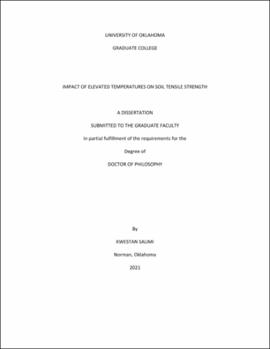| dc.description.abstract | Tensile strength of unsaturated soils is a critical factor controlling the initiation and propagation of desiccation cracks, which can threaten the structural integrity of natural and man-made earthen structures and slopes. Several engineering applications involve unsaturated soils subjected to elevated temperatures (e.g., earthen structure-atmospheric interaction under prolonged droughts, nuclear water disposal, energy piles, ground source heat pumps). While the temperature dependency of desiccation cracking is demonstrated in the literature, critical gaps remain regarding the characterization of the tensile strength under elevated temperatures. The first objective of this study is to experimentally investigate the effect of elevated temperature on the tensile strength of unsaturated clays during desiccation. To accomplish this objective, a novel testing set up that can be used to directly determine soil tensile strength during desiccation was placed in an oven to measure the tensile strength of two compacted clayey soils of medium to high plasticity under different temperatures ranging from 20 °C to 60 °C. The clays are compacted at 95% of their respective maximum dry unit weights over a range of water contents from dry to wet of optimum to investigate the influence of initial water content on tensile strength. The results demonstrated that the tensile strength decreased with increasing temperature. At the optimum water content, a tensile strength reduction of 36% and 27% in the highly plastic clay and the medium plastic clay, respectively, was observed when the temperature increased from 20 °C to 60 °C. Additionally, for the partially saturated condition, the initial water content affected the tensile strength significantly. Temperature-induced changes in key factors contributing to the tensile strength of unsaturated clays are discussed to provide further insight into tensile strength of clays at elevated temperatures.
It is not always feasible to experimentally determine the tensile strength. Therefore, it is critical to characterize tensile strength analytically to investigate the influence of desiccation and tensile cracks on the structural integrity of natural and man-made earthen structures and slopes. While several models for the prediction of tensile strength of unsaturated soils have been proposed in the literature, critical gaps remain regarding proposing a comprehensive model describing the tensile behavior of all soil types over a wide range of suction. The second objective of this research is to present a general model for the tensile strength characteristic curve (TSCC), which establishes a relationship between the tensile strength versus water content in unsaturated soils. The proposed model is applicable to various soil types ranging from clean sands to silty and clayey soils. Tensile strength is characterized using the suction stress concept and the TSCC model is built upon the concept that changes in tensile strength with water content (or degree of saturation) are primarily dominated by two distinct water retention mechanisms of capillarity and adsorption. Differences in the characteristics of capillary and adsorptive mechanisms and interparticle forces cause dissimilarities in the resultant TSCC in different soil types. Thus, a two-part suction stress characteristic curve (SSCC) was incorporated into the development of the TSCC to separately account for and distinguish interparticle forces and the resultant tensile strength under capillary and adsorptive mechanisms. The model was then validated against laboratory measured tensile strength reported in the literature for ten soils and found to capture the tensile behavior of sandy, silty, and clayey soils well. Compared to several alternative models, the predictive accuracy of the proposed model was greater, particularly for clayey soils at low water contents (high suction). This superior performance can be attributed to properly accounting for the effect of adsorption mechanism, which is significant in clays.
Desiccation cracks are triggered in unsaturated soils due to drying imposed by natural processes or engineering applications mainly involving elevated temperatures. However, there is no closed-form model in the literature to capture the effect of temperature on tensile strength. The third objective of this research is to present a temperature-dependent model for the tensile strength characteristic curve (TSCC) of unsaturated soils. The model employs the suction stress characteristic curve (SSCC) to represent the uniaxial tensile strength of unsaturated soils at different water contents and temperatures. The model incorporates the effects of temperature into adsorptive and capillary suction stress components. The temperature-dependent adsorptive suction stress is obtained by accounting for thermal induced changes in suction stress at dry state through the Hamaker constant and the density of water. The temperature-dependent form of capillary suction stress is derived by employing temperature-dependent forms of surface tension, contact angle and enthalpy of immersion. Upon comparison, results from the proposed TSCC exhibited a very good agreement against laboratory-measured tensile strength data for two clayey soils tested at different temperatures ranging from 20 to 60 °C. The presented model can improve the analysis of desiccation cracking in unsaturated soils. | en_US |
